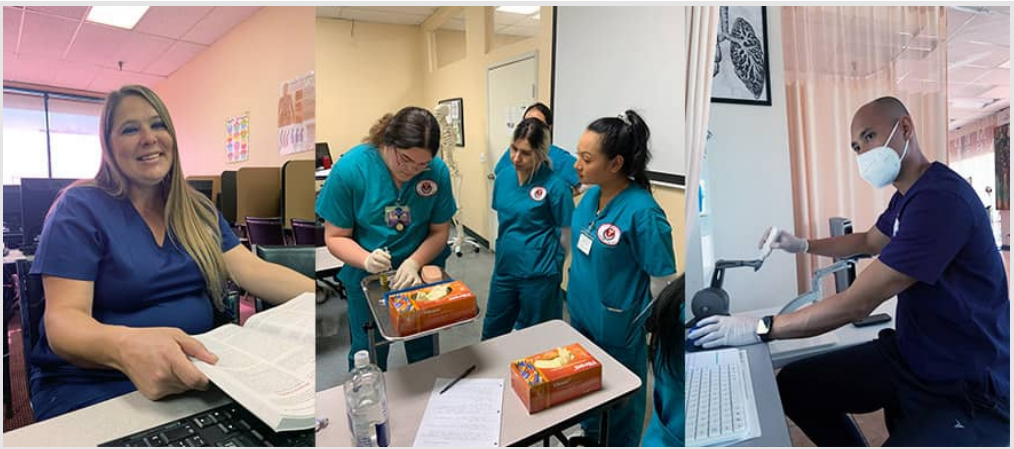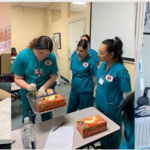The healthcare industry is one of the fastest-growing sectors, offering a wealth of high-paying jobs. But you don’t need to become a doctor to earn a great income in healthcare. Many roles require less schooling but still offer competitive salaries, job stability, and growth potential. Whether you’re passionate about helping people, working with technology, or diving into data, there’s a healthcare job for you that doesn’t require medical school.
Below, we’ll explore high-paying healthcare careers without medical school, their earning potential, required skills, and tips on getting started.
1. Registered Nurse (RN)
Why It’s a Great Option: Registered nurses play a crucial role in patient care, assisting doctors, managing treatments, and offering support to patients and families. Demand for RNs is consistently high across hospitals, clinics, and home care settings.
Average Salary: $70,000–$100,000 per year
Education: Associate’s Degree in Nursing (ADN) or Bachelor’s of Science in Nursing (BSN)
Key Skills:
- Strong clinical skills and attention to detail
- Ability to communicate and empathize with patients
- Proficiency in critical thinking and problem-solving
How to Get Started: After earning an ADN or BSN, you’ll need to pass the NCLEX-RN exam to become licensed. Check out programs at Nursing.org for more information.
2. Medical and Health Services Manager
Why It’s a Great Option: Also known as healthcare administrators, these professionals oversee the operations of healthcare facilities. They manage budgets, staff, and ensure the organization meets regulatory standards.
Average Salary: $90,000–$120,000 per year
Education: Bachelor’s in Health Administration or a related field
Key Skills:
- Strong leadership and organizational skills
- Knowledge of healthcare regulations and compliance
- Ability to manage budgets and resources effectively
How to Get Started: Consider earning a bachelor’s degree in healthcare administration. For those interested in advancement, certifications from the American College of Healthcare Executives (ACHE) can enhance your career prospects.
3. Radiologic Technologist
Why It’s a Great Option: Radiologic technologists, or radiographers, perform imaging tests like X-rays to help diagnose patients. With quick training and high demand, this role offers a solid income and a satisfying career path.
Average Salary: $60,000–$85,000 per year
Education: Associate’s degree or certification program
Key Skills:
- Proficiency in radiologic equipment and safety protocols
- Good communication skills to guide patients through procedures
- Strong attention to detail for accurate imaging
How to Get Started: Programs in radiologic technology are available at many community colleges and vocational schools. Certification from The American Registry of Radiologic Technologists (ARRT) is often required for state licensing.
4. Respiratory Therapist
Why It’s a Great Option: Respiratory therapists specialize in treating patients with breathing issues, including asthma, pneumonia, and COPD. They work in hospitals and clinics, making a direct impact on patient health.
Average Salary: $60,000–$80,000 per year
Education: Associate’s degree in Respiratory Therapy
Key Skills:
- Knowledge of respiratory care techniques and equipment
- Ability to interpret patient data and adjust treatments
- Strong communication skills to educate patients
How to Get Started: Most states require licensure, which involves passing the Certified Respiratory Therapist (CRT) exam from the National Board for Respiratory Care (NBRC).
5. Dental Hygienist
Why It’s a Great Option: Dental hygienists play a key role in oral healthcare, providing preventive care and educating patients on dental hygiene. This job offers great pay, flexible hours, and growth opportunities.
Average Salary: $70,000–$100,000 per year
Education: Associate’s degree in Dental Hygiene
Key Skills:
- Proficiency in dental cleaning tools and procedures
- Strong interpersonal skills to interact with patients
- Attention to detail for accurate assessment and documentation
How to Get Started: Dental hygienists must complete an accredited program and pass the National Board Dental Hygiene Examination. Check out the American Dental Hygienists’ Association (ADHA) for more details.
6. Occupational Therapy Assistant (OTA)
Why It’s a Great Option: OTAs help patients develop or recover daily living skills, supporting occupational therapists in executing treatment plans. The job is rewarding and in demand, especially in rehabilitation centers.
Average Salary: $50,000–$70,000 per year
Education: Associate’s degree in Occupational Therapy Assisting
Key Skills:
- Knowledge of therapeutic exercises and adaptive equipment
- Strong interpersonal skills to encourage and assist patients
- Patience and empathy in helping individuals with challenges
How to Get Started: Graduates must pass the NBCOT Certification Exam to work as a certified OTA. Visit the National Board for Certification in Occupational Therapy (NBCOT) for exam details.
7. Sonographer (Ultrasound Technician)
Why It’s a Great Option: Sonographers operate ultrasound equipment to capture images of the body, helping doctors diagnose conditions. Specializations include obstetrics, vascular, and cardiac sonography, each offering competitive salaries.
Average Salary: $60,000–$90,000 per year
Education: Associate’s degree or certification in Diagnostic Medical Sonography
Key Skills:
- Proficiency in ultrasound technology and imaging techniques
- Ability to interpret imaging data and report findings
- Good communication skills to prepare patients for procedures
How to Get Started: Accredited programs are available through community colleges. Certification from The American Registry for Diagnostic Medical Sonography (ARDMS) may be required for employment.
8. Pharmacy Technician
Why It’s a Great Option: Pharmacy technicians assist pharmacists in preparing medications, processing prescriptions, and providing customer service. It’s a well-paying role with room for advancement, especially in hospital settings.
Average Salary: $30,000–$50,000 per year, with potential for growth
Education: Certificate program or on-the-job training
Key Skills:
- Knowledge of medication names, uses, and dosage forms
- Strong attention to detail to avoid prescription errors
- Customer service skills for interacting with patients
How to Get Started: Most states require certification, which can be obtained through the Pharmacy Technician Certification Board (PTCB).
9. Biomedical Technician
Why It’s a Great Option: Biomedical technicians repair and maintain medical equipment, making them vital to healthcare facilities. With advancements in medical technology, skilled technicians are increasingly needed.
Average Salary: $45,000–$75,000 per year
Education: Associate’s degree in Biomedical Equipment Technology
Key Skills:
- Proficiency in medical equipment maintenance and repair
- Strong technical and problem-solving skills
- Attention to detail and safety protocols
How to Get Started: Many technicians earn an associate’s degree, and certifications like Certified Biomedical Equipment Technician (CBET) from the Association for the Advancement of Medical Instrumentation (AAMI) can boost job prospects.
10. Medical Billing and Coding Specialist
Why It’s a Great Option: Medical billing and coding specialists process patient data for billing and insurance claims. With healthcare regulations expanding, this role offers job security and growth potential, often with remote options.
Average Salary: $40,000–$60,000 per year
Education: Certification program in medical billing and coding
Key Skills:
- Knowledge of medical terminology and coding systems
- Proficiency with billing software
- Attention to detail and accuracy in data entry
How to Get Started: Certifications like the Certified Professional Coder (CPC) from the American Academy of Professional Coders (AAPC) can help you land a job in this field.
Final Thoughts
You don’t need to attend medical school to earn a high income in the healthcare industry. By pursuing one of these rewarding careers, you can achieve job stability, make a difference, and enjoy a lucrative salary.
Tips for Succeeding in a Healthcare Career Without Medical School
- Invest in Certification: Many high-paying healthcare jobs require specific certifications. Completing these programs can make you a competitive candidate.
- Network with Professionals: Attend healthcare job fairs and join industry associations to connect with others and discover job opportunities.
- Stay Updated: Healthcare technology and regulations evolve quickly. Continuing education can help you stay relevant and advance in your career.
By focusing on these high-demand fields, you can build a successful healthcare career without the need for medical school.






